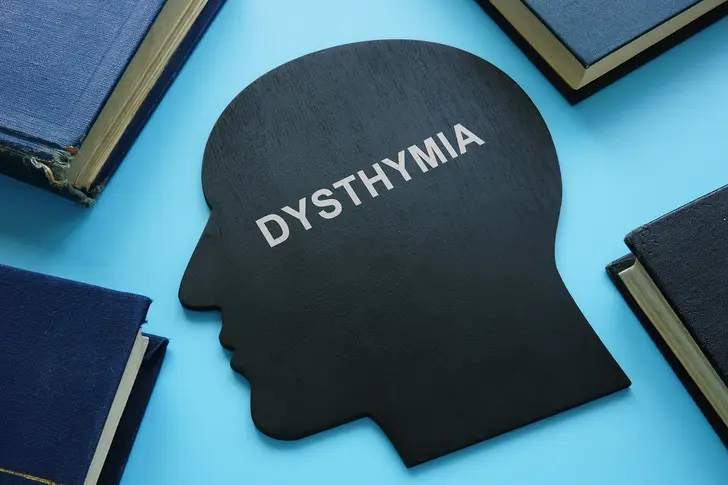- Overview
- Symptoms
- Causes & Risks
- Diagnosis
- Types
- Major Depressive Disorder
- Treatment
- Antidepressants
- Treatment-Resistant Depression (TRD)
- Living With
- Recovery & Relapse
- Complications
- Caregiving & Support
- Appointment Prep
- View Full Guide
What Is Dysthymia?


What Is Dysthymia?
Dysthymia, also known as persistent depressive disorder, is a chronic form of depression. It involves long-term, mild to moderate symptoms that last for at least two years. While these symptoms are less severe than those of major depression, they can still significantly affect daily life.

Common Symptoms
Symptoms of dysthymia include sadness that doesn't go away, loss of interest in activities, changes in weight or appetite, sleep disturbances, fatigue, feelings of worthlessness, trouble concentrating, and thoughts of death or suicide. These symptoms can make everyday tasks feel overwhelming.

Prevalence and Diagnosis
About 1.5% of adults in the U.S. have dysthymia, with women more likely than men to be diagnosed with it. Diagnosing it can be challenging due to its subtle symptoms and long duration. Mental health professionals use symptom history and questionnaires for diagnosis.

Causes and Risk Factors
The exact causes of dysthymia aren't fully understood. Genetic factors, brain chemistry, and significant life stressors may play a role. Not everyone with a family history of depression will develop the condition, which gives the disorder a complex mixture of factors.

Treatment Options
Treatment for dysthymia often includes psychotherapy, antidepressants, and lifestyle adjustments. Psychotherapy helps with managing and living with the condition, while medications, such as selective serotonin reuptake inhibitors, help manage symptoms. Healthy habits, such as exercise and good nutrition, can also make treatment more effective.
PHOTO CREDITS:
Slide 1: Vitalii Vodolazskyi
Slide 2: SB Arts Media
Slide 3: SB Arts Media
Slide 4: rubabfatima1234
Slide 5: My Ocean Production
SOURCES:
National Institute of Mental Health: "What Is Depression?" "Dysthymic Disorder Among Adults," "Persistent Depressive Disorder (Dysthymic Disorder)."
American Academy of Family Physicians: "Dysthymic Disorder: When Depression Lingers."
Fieve, R. Bipolar II, Rodale, 2006.
Diagnostic and Statistical Manual of Mental Disorders, 4th Edition (DSM-IV).
Mayo Clinic: "Persistent depressive disorder," "Cyclothymia (cyclothymic disorder)," "Antidepressants and alcohol: What's the concern?"
StatPearls: "Persistent Depressive Disorder."
National Alliance on Mental Illness: "Understanding Dysthymia."
Cleveland Clinic: "Persistent Depressive Disorder (PDD)."
Molecular Psychiatry: "Proposed endophenotypes of dysthymia: Evolutionary, clinical and pharmacogenomic considerations."